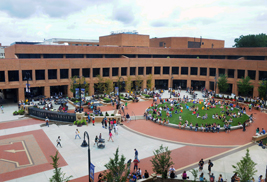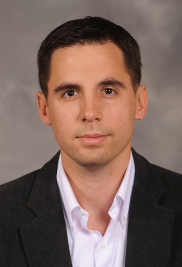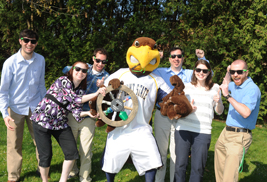eInside Briefs
News Briefs
- Town Hall Meetings Set to Discuss Tobacco-Free University
- Study Conducted by Kent State Professors Reveals Economic Impact of Akron Marathon
- Division of Graduate Studies Accepting Nominations for Two Graduate Awards
- Kent State University Competes in RecycleMania Challenge
- Kent State Doctoral Candidate Wins American School Health Association Scholarship
Town Hall Meetings Set to Discuss Tobacco-Free University

Kent State faculty, staff and students can have their say
on the university becoming a tobacco-free campus. Town
hall meetings are scheduled to be held on the Kent and
Regional campuses.
A series of town hall meetings are scheduled this spring at the Kent and Regional campuses, to gather additional input from the university community on becoming a tobacco-free institution.
Last fall, a universitywide committee was convened at the request of President Lester A. Lefton to study a proposal that would make all Kent State University campuses tobacco-free. That was in response to the recommendation from the Ohio Board of Regents that all public college and university campuses in Ohio become tobacco-free. The committee conducted a survey last semester.
The town hall sessions will be conducted at all campuses between Feb. 26 and March 14. Each session will last one hour, and faculty, staff and students are invited to attend.
You can view the schedule to find the meeting time and location at your campus. Questions should be directed to Rachael Decker, wellness coordinator, at 330-672-8368 or rdecker4@kent.edu.
back to top
Study Conducted by Kent State Professors Reveals Economic Impact of Akron Marathon

Kent State Economics Professor Shawn
M. Rohlin, Ph.D., studied the economic
impact of the 2012 Akron Marathon. Rohlin
partnered with Nadia Greenhalgh-Stanley,
Ph.D., also from Kent State's Department of
Economics, on the study.
Kent State University economics professors Shawn M. Rohlin, Ph.D., and Nadia Greenhalgh-Stanley, Ph.D., conducted an economic impact analysis of the 2012 Akron Marathon on the city of Akron, Ohio. Their study reveals that $6 million was generated by the race and more than 60 full-time jobs were created.
Rohlin’s career as an urban economist led him to conduct the study because he wanted to know the financial impact of the race. Rohlin has been asked by the Akron Marathon to conduct the study for the past three years. He asked Greenhalgh-Stanley to partner with him in conducting and writing the study.
“The purpose of the study is to determine the economic impact of the Akron Marathon in terms of salary, money spent in the region and if it created any jobs,” says Rohlin. “We find a large effect from the Akron Marathon; and in difficult economic times, it’s good to see large events like this boost the economy. Having 15,000 people come to your city— eat, drink and run — does have a substantial impact on the local economy, and I think that’s pretty interesting.”
The study results come from a survey that is done one week after the race that asks participants a variety of questions focusing on what and how much money they spent while in Akron.
“I think it shows economic justification for having a marathon,” says Greenhalgh-Stanley. “This is proof for why there should be local events. It’s really great for an economy that is struggling right now, as well as the health benefits for society.”
Rohlin offers his students the opportunity to gain real-world experience by allowing them to participate in the study. In 2010, master’s students in his economics classes helped to conduct the study while he oversaw their work. He hopes to have more master’s students participate in the study in the future.
Rohlin’s goal is to contact other race organizers and have students do similar studies on their economic impact.
For more information about Kent State’s Department of Economics, visit www.kent.edu/business/economics.
back to top
Division of Graduate Studies Accepting Nominations for Two Graduate Awards
Kent State University’s Division of Graduate Studies is now accepting nominations for the 2013 Graduate Dean’s Award (GDA) and the Graduate Dean’s Travel Award (GDTA).
The Graduate Dean’s Award seeks to enhance Kent State’s recruitment and support of academically excellent students with diverse backgrounds. The Graduate Dean’s Award supplements stipends offered by an applicant’s graduate program, and the total award for each recipient is $5,000. Recipients agree to a two-year commitment with the award broken up by $2,500 each year.
The Graduate Dean’s Travel Award is a new award designed to support departments in their recruitment of academically talented students from diverse backgrounds. The Graduate Dean’s Travel Award provides applicants up to $400 toward the cost of travel to Kent State for campus interviews and visits.
Kate McAnulty, director of Graduate Student Services, says faculty members nominate students whom they feel are deserving of the awards. McAnulty says the faculty members who make nominations build a relationship with the nominee through interviews and application materials. Both awards require a form for faculty members to fill out. Nominees may submit supporting documents for the committee to review.
McAnulty says that Graduate Student Services decided to add the Graduate Dean’s Travel Award following last year’s feedback.
“We saw a need after speaking with them about their experiences,” says McAnulty. “We asked if they had visited Kent State and what their departments did to help with costs. After reviewing their responses, Dean of Graduate Studies Mary Ann Stephens was very committed to supporting the costs of visits.”
Nominees for both awards must be new graduates enrolled in a master’s or doctoral program and underrepresented in their discipline. Submissions are open throughout the spring semester, and the awards will be given to the recipients starting in the fall semester.
For more information, including eligibility requirements and the nomination form for the Graduate Dean’s Award, visit www.kent.edu/graduatestudies/faculty-staff/deanaward.cfm.
For more information, including eligibility requirements and the nomination form for the Graduate Dean’s Travel Award, visit www.kent.edu/graduatestudies/faculty-staff/deantravelaward.cfm.
If you have questions, contact McAnulty at kmcanult@kent.edu.
back to top
Kent State University Competes in RecycleMania Challenge

Kent State University mascot Flash and the university’s
RecycleMania team pose with the Braggin’ Wheel, won in
last year’s informal recycling competition with the University
of Akron.
Kent State University is participating in the annual RecycleMania challenge, an international competition where colleges and universities strive to reduce waste and increase recycling. The month of February marks the official start of the 2013 RecycleMania calendar.
RecycleMania is supported by the sustainability office, which specializes in the ongoing recycling efforts at Kent State University.
“Residence Services is bringing the friendly competition a bit closer to home for students by presenting a hall-versus-hall challenge,” says Andy Weyand, assistant director for administrative operations and facilities, at Residence Services. “The recycling collections from each hall will be measured and scored, and after eight weeks, Residence Services recognizes the building(s) that recycled the most per capita. A $200 recognition goes to the hall council representing the winning building.”
"This will be Kent State’s fourth year participating in the tournament and the second year competing head-to-head with the University of Akron for the recycling ‘Braggin’ Wheel,’” says Melanie Knowles, sustainability manager at Kent State University.
“We’ve dubbed the traveling trophy as the RecycleMania ‘Braggin’ Wheel,’ and I should proudly point out that the Golden Flashes are in possession of said trophy,” says Weyand. “We want to keep it for 2013!”
Knowles says that the eight-week tournament is a good time for students, faculty and staff to be mindful to reduce, reuse and recycle.
“On-campus recycling is single stream, which means that plastic containers (#1 and #2), glass, aluminum, paper, paperboard and corrugated cardboard, can all go in the same recycling container, indoors or outdoors,” Knowles says.
“I can speak for Residence Services – our resident assistant, hall director, assistant hall director, housekeeping staff, and administrative staff members each play a role in the RecycleMania challenge each year,” says Weyand. “It’s a two-month span that we really focus on building the habit of recycling.”
The tournament is for the entire campus. By framing recycling in competitive terms, RecycleMania seeks to tap school spirit as a motivator to reach students and staff who may not otherwise respond to environmental messages.
“The larger outcome for the program is to build awareness of the campus recycling programs across North America and to have one collective push toward building the recycling habits of those individuals on and visiting the campus,” says Weyand.
The most recent 2012 competition included 605 colleges representing 49 states. More than 6.2 million students and staff participated, collectively recycling 94 million pounds of recyclables and organic materials.
"We’d like to see the faculty and staff start thinking green and carrying it back to the classroom or the office, says Bill Steiner, director of Portage County Waste. “Making recycling a priority will really help out the local economy. The waste district has a $2 million impact on the economy through our wages, taxes and business. "
For more information, visit www.kent.edu/housing/stories/recyclemania-2013.cfm.
back to top
Kent State Doctoral Candidate Wins American School Health Association Scholarship
Elizabeth Fettrow, doctoral candidate in Kent State University’s Health Education and Promotion program, was awarded a $1,000 scholarship from the American School Health Association (ASHA). ASHA provides financial assistance for students whose goals include the health of youth. The ASHA award ceremony was held in October.
“I am humbled that my scholarship application was selected for this competitive student award,” says Fettrow. “It was an honor to be recognized in front of members of the American School Health Association and leaders in the field of school health.”
In addition to submitting an application, applicants wrote professional philosophies of their academic discipline and detailed academic and professional goals as related to ASHA’s mission.
Fettrow serves as a part-time faculty member for Kent State’s Health Education and Promotion program. She is a member of the ASHA and a member of the Eta Sigma Gamma Honor Society. She has given five different presentations at ASHA national conferences. Fettrow has been invited to share her expertise with the Centers for Disease Control and Prevention’s National Institute of Occupational Safety and Health.
Cynthia Symons, D.Ed., professor of health sciences at Kent State, is Fettrow’s doctoral advisor and mentor.
“Elizabeth has invested a significant amount of time over a number of years in service to the American School Health Association,” says Symons. “Her demonstrated commitment to research alone would have made her a worthy candidate. When combined with her professional service activities to this learned society, it was clear that she distinguished herself from other nominees for this important scholarship.”
The ASHA awards three scholarships annually, one each to students in these specializations: school health education, school nursing, pediatric/adolescent medicine or dentistry.
back to top